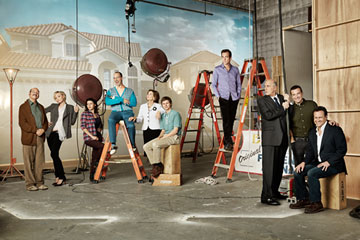
On set with the cast of Arrested Development.
(2 of 6)
Arrested development premiered on the Fox network a million years ago, in 2003, when there was still pretty much one way to watch a TV show: on television, the night it aired. DVRs were still a relative rarity, the iTunes store had just launched, Hulu didn't exist, and Netflix was a service that mailed you DVDs in red envelopes. In retrospect, Hurwitz says, the limitations on how viewers got their TV adversely affected Arrested Development, which he crammed with callbacks to previous episodes, sly references and "jokes that you could only get if you had the ability to pause and rewind." In Episode 11 of Season 2, a renegade seal bit off the hand of Buster Bluth (Tony Hale); the "loose seal"--a play on Buster's Oedipal issues with his domineering mom Lucille (Jessica Walter)--was mentioned in a background newscast during the season's first episode.
The same layered comedy and blink-and-you'll-miss-it dialogue that made Arrested Development a diamond of comedic compression probably doomed its ratings: it demanded that you lean in, and most people still watched sitcoms to veg out. But the show was custom-engineered for a newly developing culture of fandom organized around DVDs, downloads and--especially--online streaming. This new kind of TV fan would binge-watch seasons--even entire series--at a run, engaging intensely and picking up details that casual weekly viewers might not. The new viewers had become accustomed to a denser, mockumentary style of comedy thanks to later TV hits, like The Office and Modern Family, that Arrested Development had paved the way for. They responded to the sorts of things TV creators were taught to avoid: complexity, textures, challenge. They wanted more. Arrested Development reruns, packed as tight as the hold of a space shuttle with comedy, gave them that.
So even as Arrested's cast moved on to other projects, they noticed a strange phenomenon: they were being approached on the street more often as the stars of a canceled TV show than they were when it was on the air. Says Walter: "There wasn't a day when people wouldn't ask, 'My God, Arrested Development--are they going to make a movie?' They'd quote my lines. They'd quote lines I didn't even remember I had."
Someone else noticed too. Netflix, which Reed Hastings co-founded in 1997 as an online video-rental company, was transitioning from DVD mailings to streaming video. (This shift included the 2011 p.r. disaster when Netflix proposed splitting into separate streaming and DVD companies.) As streaming became a bigger part of Netflix's business, so did TV shows. Studios were more reluctant to license movies for streaming, and fans were more likely to watch TV series on Netflix when they didn't have to rent DVDs. (According to the company, TV series made up 18% of its DVD rentals at most but about 70% of its streaming traffic.)
One advantage of streaming is the data. "We track viewing to the second," says Netflix chief content officer Ted Sarandos. "We know who's watching, how many episodes you're watching, what devices you're watching on, how long your viewing sessions are." All that data, Sarandos says, was telling them that whereas most canceled cult shows maintain a small, diehard fan base, Arrested Development's was getting bigger.
